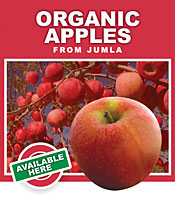 |
This year Jumla's A grade, gleaming organic apples are selling for as much as Rs 350 a kilo to the health-conscious Kathmandu elite willing to pay a premium for organic. Jumla's organic certified apple farmers are now receiving Rs 35 a kilo instead of Rs 10, and this is projected to rise next year.
The region's seven apple varieties represent part of a wider strategy to brand Jumla an 'organic district'. In 2007, the local district council banned the import and use of chemical pesticides and fertilisers. All produce from the region is by default organic because the farmers have no access to and can rarely afford to use chemicals. The Jumla apples are the country's first fruit to be certified (by independent company Organic Certification Nepal) under the government's new guidelines.
The construction of the Karnali road between Jumla and Surkhet, which partially opened in 2007, is still incomplete but farmers are hopeful it will be completed within two to four years. This would give them a cheaper and greener route to market (Kathmandu is 600 km away). In anticipation some 10,000 households in the district now have apple orchards with 300 apple growers already certified organic.
For now the road is still impassable during the monsoon and the apples are being flown to Surkhet well packaged and protected, then transported by road for the final 400 potholed kilometres to the capital to ensure they are in the shops in the run-up to Dasain.
The District Agriculture Development Office in Jumla is collaborating with the Jumla Chamber of Commerce and Dutch NGO SNV, and has received funding from agencies such as the International Fund for Agricultural Development and World Vision to train more than 300 farmers this year.
"The farmers' level of knowledge, especially regarding harvesting and packaging, was very low," says Bhairab Kaini, horticulturalist at the Nepal Horticultural Promotion Centre. "They were harvesting very traditionally and roughly by shaking the trees till the fruit fell."
The fledgling organic apple industry marks a steep learning curve for farmers. But SNV Value Chain Advisor Rik van Keulen is positive about their investment. "Word has spread about Jumla apples. The whole mid and far west above 2000m is very suitable for apple growing. To change to organic in areas where chemicals are already being used is tough. But areas like Jumla and Dolpa, where we've heard the apple quality is even higher, are by default organic."
Apples were first introduced to the region in the late 1960s by the visiting monarch, who brought them as a gift from Kashmir. But the promised road was never completed and any early hopes for a market stagnated for 40 years. This year, the organic mantra may help Jumla farmers unleash their full potential.
Jumla apples are now available in Kathmandu at Bhat Bhateni, Navadurga Department Store, Kastamandap Bajaar and Saleways.
Apple trouble
The harvest of Jomsom apples is down a whopping 60 per cent this year because of the late monsoon, poor roads and an apple disease that's blighted orchards in several Village Development Committees.
Apples thrive in dry climates, but conditions in the far west have been unusually dry this year. "This is all due to global warming. It has been particularly bad in high altitude places like Mustang, where that hasn't been snow this year," says CR Gurung, Chief of Citrus Development Program in Kirtipur.
Orchards in other popular apple-producing districts like Mustang, Manang, Jumla and Dolpa have also been hit hard by the dry spell. As a result, apples have ripened earlier than usual. They usually hit the market in late September or early October.
Harvesters have had trouble ferrying apples to major markets because the Jomson-Beni highway has fallen into disrepair. They have also had to grapple with apple scab, which causes dark, scab-like lesions to appear on tree leaves and significantly reduces yield.
Like apples from other parts of the country, Jomsom apples are grown almost totally organically, although chemicals are sometimes used to treat diseases like apple scab. Many world-famous varieties of apple are grown in Jomsom. They were imported by American NGOs and the Indian government, which has contributed enormously to apple development in the region.
Despite the troubles, Jomsom apples really stand out for their taste. "The apples are very juicy," says Gurung.
Suvayu Dev Pant


